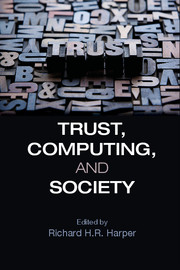Book contents
- Frontmatter
- Contents
- Author Biographies
- Acknowledgments
- Dialogues Trust, Computing, and Society: Introduction
- Part 1 The Topography of Trust and Computing
- Part 2 Conceptual Points of View
- 5 Computing and the Search for Trust
- 6 The Worry about Trust
- 7 The Inescapability of Trust: Complex Interactive Systems and Normal Appearances
- 8 Trust in Interpersonal Interaction and Cloud Computing
- 9 Trust, Social Identity, and Computation
- Part 3 Trust in Design
- References
- Index
- References
6 - The Worry about Trust
from Part 2 - Conceptual Points of View
Published online by Cambridge University Press: 05 March 2014
- Frontmatter
- Contents
- Author Biographies
- Acknowledgments
- Dialogues Trust, Computing, and Society: Introduction
- Part 1 The Topography of Trust and Computing
- Part 2 Conceptual Points of View
- 5 Computing and the Search for Trust
- 6 The Worry about Trust
- 7 The Inescapability of Trust: Complex Interactive Systems and Normal Appearances
- 8 Trust in Interpersonal Interaction and Cloud Computing
- 9 Trust, Social Identity, and Computation
- Part 3 Trust in Design
- References
- Index
- References
Summary
Introduction
The main thesis of this chapter is: trust in the context of the Internet, and elsewhere too, is usually best understood as a continuation of the normal run of life, not as an exception to it. We need to look at those usually unchallenged background activities, contacts, and commitments that, at some point, lead up to situations in which questions about trust are asked. This is not to say that we constantly trust each other, but it means that the question only has an application in particular situations, and that the meaning it has must be understood in the context of the situation. As a further, methodological remark, continuous with the previous point, I suggest that what trust “is” is best seen in situations in which “trust” is raised as an issue. To understand trust, we should not be looking for a mental state, attitude, or behavioral pattern “out there” for which the word stands. We should focus on the various kinds of worry that invite talk about trust; on what prompts us to apply the vocabulary of trust in certain problematic situations; and on how applications of that vocabulary contribute to solving, creating, or transforming those situations.
This also invites the question to what extent particular worries about trust are specific to the use of the Internet, as opposed to being continuous with what happens in other walks of social life. There exists a misleading picture that represents the Internet as a world unto itself, an incorporeal realm facing us with a specific set of philosophical and ethical conundrums. This looks to me like a romanticization of the Internet. It is more fruitful to think of our various uses of the Internet as so many extensions of our off-line practices.
- Type
- Chapter
- Information
- Trust, Computing, and Society , pp. 120 - 143Publisher: Cambridge University PressPrint publication year: 2014
References
- 2
- Cited by



